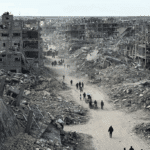Uganda, 5-7 June 2013 – With the support of Avocats Sans Frontières (ASF) and local partners, victims of the conflict in Northern Uganda have made recommendations on the national transitional justice policy. This input is critical for handling gross human rights violations and war crimes, achieving national reconciliation and long-lasting peace in the country.
For the past two decades, the rebel group known as the Lord’s Resistance Army (LRA) fomented insecurity among the populations of northern Uganda. Gross human rights violations were committed including rape, murder, child abduction and looting, affecting people in rural areas.
Since 2008, the security situation in the country has stabilised and a transitional justice process was launched to deal with those crimes. “Every country that experienced armed conflict has had to answer the same questions, but develops its own unique approach to handling the past legacy of war crimes and gross human rights violations”, says Ismene Zarifis, ASF Head of Mission in Uganda. “As a victim-oriented organization, we are committed to supporting victim communities and enhancing their voice in policy and lawmaking processes”.

This is why from June 5-7th, 2013, ASF and its partners (the Justice and Reconciliation Project and the African Youth Initiative Network) hosted meetings in the Northern Districts of Gulu and Lira to meet with victims to seek their recommendations on the draft Transitional Justice Policy for Uganda. This Policy is an important opportunity for the Government to provide guidance on how it intends to handle justice and accountability for serious crimes, and at the same time, how it plans to balance this with serving the rights of victims to truth, justice and reparations.
During these discussions, victims expressed their views about their needs and made recommendations such as broad victim participation throughout the transitional justice process, protection of witnesses, and the need for the Courts to take into account the individual circumstances of people who were victims and perpetrators at the same time.
The victims in both districts also proposed that there should be no ‘blanket’ amnesty. “Amnesty should be applied only if the criminal first apologizes before the victims and acknowledges the crimes”, said a male victim from Barlonyo, Lira District, during the meeting. “Justice is done and then we can agree to get along.”
ASF submitted the key findings and recommendations from these meetings to the Justice Law and Order Sector (JLOS) for its consideration in the finalization of the transitional justice. Created in 2001, the JLOS adopts a sector wide approach bringing together judicial actors and institutions in order to develop a common vision, policy framework, and objectives.
“Through our action, we aim at ensuring that victims will play an active role in the transitional justice process”, concludes Ismene Zarifis. “Our experience in other post-conflict settings such as Rwanda, Burundi and Tunisia shows that victim participation in handling war crimes and human rights violations is a key element to lasting peace”.
For more information, read the following ASF publications:
- ASF position on the Transitional Justice Policy for Uganda
- ASF-AYINET (African Youth Initiative Network) report on victim consultations in Lira
- ASF-JRP (Justice and Reconciliation Project) report victim consultations in Gulu
Cover photo: Rural communities in Northern Uganda affected by war crimes are being sensitized about transitional justice © ASF



